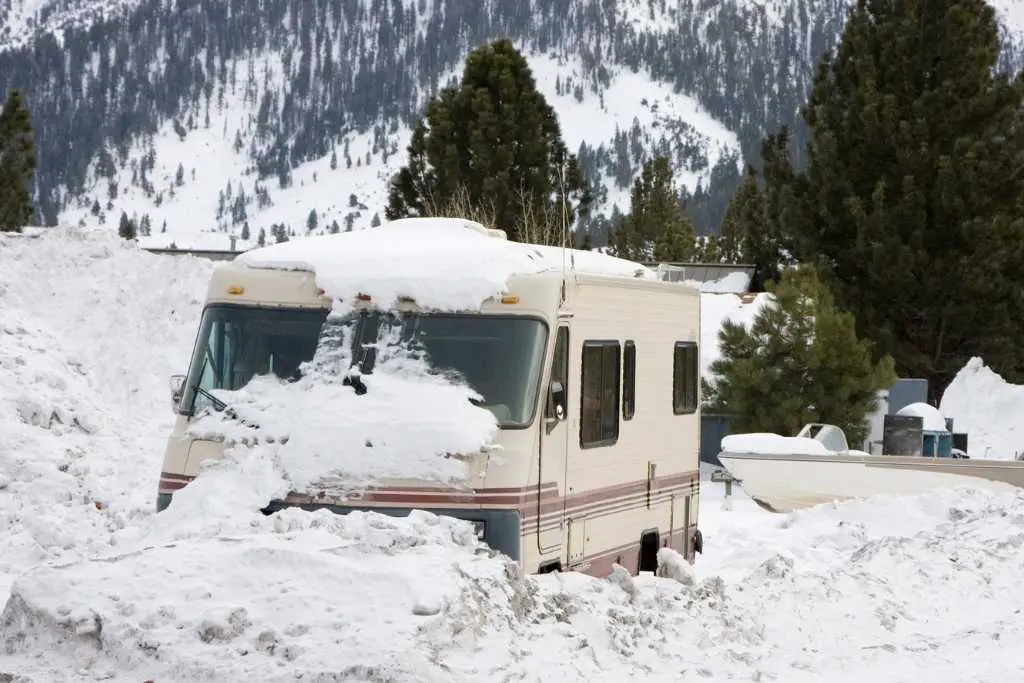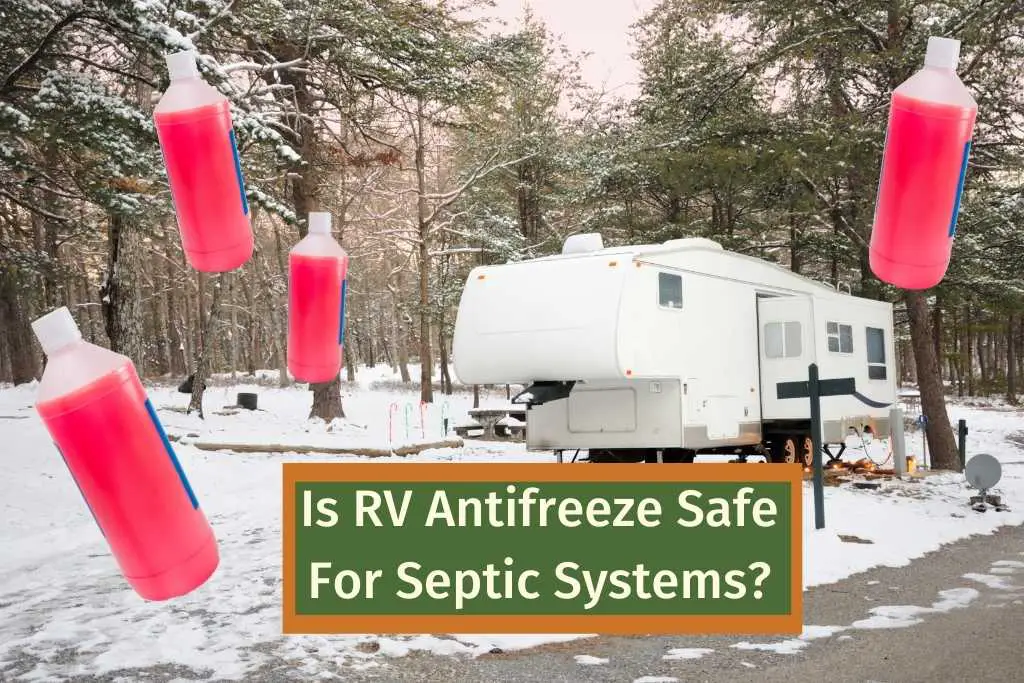I have a love hate relationship with winter. I love getting nice and cosy in my RV with a thick blanket, a good book and a hot chocolate. But, I hate winterizing my RV. Most RVers in colder climates will know that you have to winterize your RV. One of the main components used to winterize RVs is RV antifreeze. But, is RV antifreeze safe for septic systems?
RV antifreeze is safe for your RV septic system. However you need to make sure that it is used correctly to avoid damage. Avoid overloading your RV septic system with RV antifreeze and DO NOT use standard antifreeze in your RV.
In order not to incur expensive septic tank repairs for your RV, you need to use it correctly. In this article I will detail the right way to use your RV antifreeze in your septic system.
Is RV Antifreeze Safe For Septic Systems?
RV antifreeze is not toxic and will not harm your septic system. It’s important to make sure that you are using RV antifreeze and not automotive antifreeze. This is because the active ingredients in them are different and will have different impacts on your RV septic system.
RV antifreeze is dyed pink and has the active ingredient of either ethanol or propylene glycol, neith of these will harm your RV septic tank. However car antifreeze has ethylene glycol as its active ingredient and this will cause damage to your RV tanks if used by mistake.
Both types of antifreeze will lower the freezing point of water to prevent it from freezing. However, because of the different ingredients they act differently, in your septic system and with the environment. Automotive antifreeze is also toxic to humans where RV antifreeze is not.
Ethylene glycol in car antifreeze is damaging to your septic system because it will kill off all the good bacteria in there. Like your gut, your septic system needs the good bacteria to help break down the waste and reduce odors. Without the good bacteria your tanks will clog and smell pretty bad.
When dumped with the septic tanks the phosphates in the automotive antifreeze can lead to an overgrowth of biomass in the drain field.
RV antifreeze is not toxic and is more environmentally friendly, it’s even safe enough to be swallowed in small amounts – although I wouldn’t advise it. Because of the properties of the RV antifreeze it’s safe to use in your RV septic system as it won’t harm the balance of bacteria and can be safely dumped.

How to Winterize Your RV Septic System Without RV Antifreeze?
RV antifreeze is non-toxic and won’t harm your RV plumbing system. RV antifreeze is good at it’s job, keeping the water and liquids flowing through your RV and is safe to drink in small quantities.
Some RVers use washer fluid in their RVs plumbing system instead of RV antifreeze. I don’t recommend doing this for winterizing your RV dumping large quantities of washer fluid into your RV plumbing system could cause damage.
People use washer fluid as it’s cheaper and reduces the freezing point to a lower temperature. However washer fluid is highly toxic and should not be consumed or dumped in the sewer. If you are desperate and have no other option then only use a small amount and don’t drink any contaminated water.
If you want to winterize your RV and won’t be using it over the cold months then a great option is to drain all of the water out of your RV plumbing system. If there are no liquids then there is nothing to freeze.
To empty your tanks completely use the blow out method:
- Turn off the power to your RV water heater a day before you want to drain the system. This stops boiling water coming out of the system.
- Drain the freshwater tank on your RV, this is the valve that has “city water” on it. If your RV has them open the low drain point valves too.
- Connect a sewer hose and drain the black and grey water tanks. Read our article about how to use a sewer hose here.
- Disconnect all the water supplies and turn off the water pump.
- Drain the last of the water out of the water heater by opening the pressure release valve.
- Now you have let all the water run out the RV it’ time to clear the lines with an air compressor.
- Grab your portable air compressor, you will use this to blow air through the plumbing system.
- The air compressor won’t fit onto the valve so fit a blowout plug on your RV’s fresh water inlet.
- Connect the air compressor hose to the blowout plug, and plug it into a power source.
- Set the pressure to 30 PSI on the air compressor and turn it on. You will need a regulator to make sure the pressure doesn’t get too high and burst the water lines. Let it run for a few minutes then turn it off.
- Turn on a faucet to drain the hot water then turn the air compressor back on the clear the hot water line. Do the same with the cold water, and other faucets in your RV. Flush the toilet and run the shower to clear those lines.
- When you’ve cleared all the faucets, toilet and shower in your RV, unplug and disconnect the air compressor and close all the valves. You’ve successfully cleared out your water lines.
How Do I Winterize My RV Septic System?
If you’re not using your RV for the winter then the best way to winterize your RV septic system is to drain it completely. The guide for how to drain the plumbing system via the blow out method is detailed above.
If you are brave enough to be camping in freezing conditions then there are a few measures that you can take to winterize your septic system.
- Get a good quality heated water hose, I have done a full guide on how to buy the best heated water hose for your RV.
- Make sure your system isn’t leaking, any leaks will be a weak point for freezing so make sure that you patch them up.
- Insulate your pipes, you can use blankets, mulch or heat pads to help keep the contents of your pipes flowing.
- Use water as much as possible, if you’re really worried about your pipes freezing you can leave a faucet dripping to keep the water moving. Use hot water as much as possible to keep the system warm.
- Use RV antifreeze, pour RV antifreeze into your system to prevent the liquids freezing, make sure that you read the instructions first.
How Long Does It Take For RV Pipes To Freeze?
It only takes one cold night (or day) for your pipes to freeze. If temperatures are particularly low or your pipes are not insulated well enough they will freeze easier.
If your RV pipes freeze then it will be like your plumbing system is clogged, your sinks and toilets won’t drain. Because it is clogged with ice.
To prevent your pipes from freezing, try to insulate them as well as possible. This could be burying them under soil, mulch or even snow.
Heat tape can be useful to wrap around the pipes and heated hoses are a must for any RVer in cold temperatures.
If your pipes are frozen, RV antifreeze won’t help, because your pipes are already frozen. You will need to call a plumber to thaw your system out professionally to minimise damage.
Is RV Antifreeze Safe For Septic Systems FAQ’s
If you still have more questions about RV antifreeze hopefully they will be answered below, but if not get in touch.
Can RV Antifreeze Be Used In Cars?
No, car antifreeze and RV antifreeze are very different and RV antifreeze should not be used in cars. They are made of different chemical components that do different jobs, RV antifreeze is only designed to stop liquid freezing. Car antifreeze is designed to stop liquid freezing and boiling.
Putting RV antifreeze in your car can damage the radiator and heater core because it can’t regulate higher temperatures effectively.
Will RV Antifreeze Melt Ice?
RV antifreeze will not melt ice. It lowers the freezing point of liquids to prevent them from freezing but once it’s frozen it won’t melt the ice.
If you need to melt ice, using a heat source is your best option.
Can I Use RV Antifreeze For Windshield Washer Fluid?
RV antifreeze should not be used for windshield washer fluid. The chemicals that RV antifreeze are made up of (propylene glycol) is oily and will smear your windshield. It’s also pink so will stain your windshield too.
Don’t use RV antifreeze to clean your windshield or any glass, because it won’t work properly and end up making them dirtier and harder to clean.
Final Thoughts
RV antifreeze is an essential part of every RVers kit, especially if you are in colder climates. It is safe for your septic system and will prevent your plumbing from freezing over in winter.
Fight back against the cold and make sure your pipes are insulated properly and you’ve got your trusty RV antifreeze with you.


